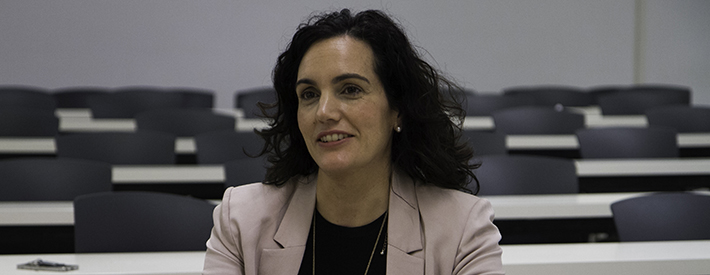News
LATEST NEWS AND EVENTS FROM THE SCHOOL OF ENGINEERING
A female voice in the new technological era
Paloma Grau, deputy director of Tecnun-School of Engineers of the University of Navarra

We reproduce below the article opinion piece by Paloma Grau, deputy director of Tecnun- Engineering School of the University of Navarra, which has been published in El Diario Vasco on the occasion of the International Day of Women and Girls in Science.
"On 15 December 2015, the United Nations General Assembly proclaimed 11 February of each year as the International Day of Women and Girls in Science. Since that day and every year, millions of events are held all over the world to highlight and encourage present and future female scientists and engineers in their professional careers.
Although it is true that the presence of women in STEM (Science, Technology, Engineering and Mathematics) careers is increasing, there is still today a great inequality in the proportion of men and women who study technical careers and develop their professional careers in this field. Some data from the academic world, where I come from, indicate that the percentage of female students studying engineering is currently 25%. Considering that in the next few years it is estimated that half of all jobs will be related to engineering, we can assume that the inequality between men and women in this field will continue, and may even be further accentuated.
There are several factors that may influence this inequality: few female references that inspire our female students to see technical careers and professions as something attainable and attractive, cultural aspects or education that our daughters and students experience in their childhood or, simply, something that seems relevant to me; women in general are more sensitive to social realities and problems than to technological issues. It is remarkable the high percentage of women in careers and professions dedicated to the service of people from the field of medicine or Education, to cite just a couple of examples.
In this sense, I think that in the coming years women have a great opportunity in engineering. Why? Simply because the social and technological spheres have never been as close as they are now. At no other time have the effects of development technology on health, on human relationships, on our own daily lives, or on the care of our planet been so evident. The possibility of treating diseases such as cancer through genetic modifications in the field of biomedical engineering, the application of techniques based on artificial intelligence to improve our daily lives or the development of new technological solutions that allow us to live in a more sustainable world are just some of the examples.
In the School of Engineering of the University of Navarra, for some years now, we have been firmly committed to expand our academic programs in this line, offering Degrees as Biomedical Engineering or design Industrial, in which in some promotions the female presence has been higher than the male presence. On the other side of the scale are the traditional engineering careers, such as Mechanical, Industrial or Electrical/Electronics, which have historically been more in demand by boys. But, even in these, we are beginning to notice an upturn in the female presence and I think this is good news because women also have a great opportunity and responsibility in these fields. Our intuition, practicality and capacity for empathy are also fundamental when it comes to setting limits and redirecting new scientific and technological advances to achieve a fairer and kinder world. At final, a more humane world.
Finally, let us not deceive ourselves, scientific and technical careers involve great effort and dedication, but our professional vocation should not prevent a life compatible with our family and motherhood, which, in my opinion, make us better as people and as professionals. I think it is very important that this idea permeates the university and business environment and that appropriate initiatives are promoted so that men and women can reconcile our profession with the care of our children and families in an equitable and balanced way. In this sense, I feel fortunate to be able to carry out my profession in an institution that promotes not only the professional development of women scientists, but also our family reconciliation. This is the only way we can be a reference for our children and students.
